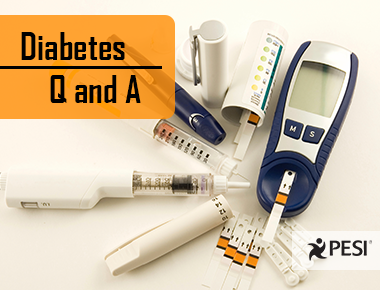6 Questions to Test Your Diabetes IQ

Q: What new medications are available for Diabetes Mellitus?
There are now 8 classes of medications available to treat Type 1 diabetes (T1DM) and Type 2 diabetes (T2DM) respectively. They include:
- Sulfonylureas
- Biguanides
- Meglitinides
- Thiazolidinediones
- DPP-4 inhibitors
- SGLT2 Inhibitors
- Alpha-glucosidase inhibitors
- Bile Acid Sequestrants
T1DM is absolute insulin deficiency caused by an autoimmune response, which attacks the beta cells of the pancreas and represents less than 10% of all cases of diabetes. It generally occurs in children and in the past was called Juvenile diabetes.
T2DM is a relative insulin deficiency and insulin resistance and represents 90% of all people with diabetes. Often 75% of those are overweight or obese, thus the name “diabesity” has been coined representing the obesity and diabetes epidemic in the United States.
Q: Have you wondered what LADA and MODY mean?LADA stands for Latent Autoimmune Diabetes of the Adult and has been termed “Diabetes 1.5” as it manifests clinically as T1DM but occurs in an adult who requires insulin management.
MODY stands for Mature Onset Diabetes of the Young and manifests clinically as T2DM with overweight or obesity but in children.
Q: Do you know what MDI and CGM are?MDI is an acronym for Multiple Daily Injections and means a person is receiving several injections of insulin each day. CGM stands for Continuous Glucose Monitoring and is a monitor applied below the skin for generally 7 days to read changing blood glucose levels throughout the day minute by minute instead of just one data point after a finger stick sugar reading.
Q: Did you know that inhaled insulin is now available again?Afrezza by Sanofi is inhaled fast acting insulin and given generally before meals to help with post prandial (after meal) high blood sugar levels. After nasal insulin was recalled by the FDA for too many respiratory complications several years ago, the new Afrezza offers insulin without injection and hope for many people with diabetes.
Q: Are you aware of current research on the artificial pancreas technology?The artificial pancreas is the use of technology that combines the continuous subcutaneous insulin infusion (CSII) “insulin pump” and continuous glucose monitor (CGM). They work together to measure blood glucose levels in real time and automatically deliver the required insulin. Several companies are racing to provide the method to truly respond how the natural pancreas works within us and will revolutionize the management of diabetes mellitus.
Now that you've tested your IQ, are you ready to help your diabetic patients make decisions to optimize their health outcomes? Click here for free diabetes infographics that are perfect for sharing.
This blog was brought to life by PESI speaker Tracey Long, PHD (C), RN, BSN, MS, MSN, CDE, CNE, CHUC, CCRN. Long has over 28 years of nursing experience working in critical care & cardiology. She developed Spanish programs in health education and diabetes for local hospitals in Las Vegas, and currently, she is faculty of nursing at the College of Southern Nevada. With a passion for active learning, and as an international speaker and award winning educator, Tracey helps students not just memorize, but truly learn the content material needed to successfully master skills and learning.
Topic: Diabetes
Tags: Diabetes Mellitus | Insulin


